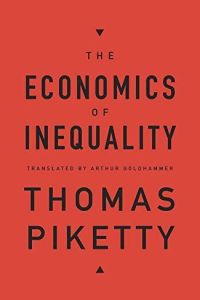Join getAbstract to access the summary!

Join getAbstract to access the summary!
Thomas Piketty and Arthur Goldhammer
The Economics of Inequality
Belknap Press, 2015
What's inside?
This early inquiry into wealth and income inequality set the stage for Thomas Piketty’s later works.
Recommendation
This early study of income inequality by economist Thomas Piketty still has a lot to offer to today’s economic policy debates. Unlike his later best-selling tomes, this is a relatively short, analytical primer on the basic concepts of income inequality, filtered through Piketty’s interplay of reasoning and empirical investigation and relayed in his solid and exacting style. Domestic inequality in developed countries has come into sharper focus since 1997, when this book was first published in French, and Piketty has been on the case ever since.
Summary
About the Authors
Thomas Piketty is a professor at the Paris School of Economics and the author of the best-selling Capital in the Twenty-First Century and Capital and Ideology.





















Comment on this summary